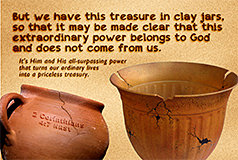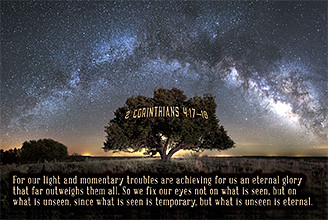Second Corinthians 4:1–18 . . .
Christ Is to Be Known through the Likes of Us
There are two key themes in today’s passage.
1) The paradox of treasure in jars of clay: Paul emphasizes the contrast between human frailty and the surpassing power of God. He describes believers as fragile “clay jars” containing the priceless treasure of the gospel. This imagery highlights how God’s strength is made perfect in human weakness.
2) Eternal perspective in the face of suffering: In addition, Paul encourages believers to never lose heart despite outward afflictions. Instead, believers must focus always on the eternal glory that far outweighs temporary troubles. He urges Christians to fix their eyes on unseen, eternal realities, rather than visible, temporary circumstances.
Both themes underscore Paul’s teaching on the nature of Christian ministry, the transformative power of the gospel, and the hope that sustains believers through trials and tribulations.
The first six verses of chapter 4 provide many answers about the powerful gospel of Jesus! First, they explain why so many people don’t believe the gospel when they first hear it, or even after they’ve heard it over a long period of time. Second, we’ll learn why many who believe the gospel quit believing it after they’ve been walking the Christian way for some time; third, we’ll learn why some people who you’d think would never believe it, suddenly do so. Today’s passage begins with a tremendous declaration by Apostle Paul about his reaction to his own ministry: “Therefore, since through God’s mercy we have this ministry, we do not lose heart” (v. 1, emphasis added).
All through this passage, Paul repeats that theme, telling us, We don’t get discouraged; we don’t feel like quitting; we remain confident; and we become encouraged. In a sense, as we’ve seen throughout this second letter, every Christian is in “this ministry.” Those Christians who are ready to quit might feel that they aren’t achieving anything; basically, they don’t see themselves as Paul did, as being a working instrument of God. They’re focusing on what they’re doing or not doing for God, rather than understanding the basis for their ministry, which Paul calls “the new covenant,” the new arrangement for living, which God has provided in Christ. In vv. 2–4 (see passage at bottom of page), the apostle gives us two great reasons why the new covenant doesn’t allow for discouragement.
Paul’s pretty much telling his readers, We’ve turned our backs on the ways and practices that bring discouragement. I don’t need that anymore; I’ve given it all up. I refuse to tamper with the Word of God. How does Paul prevent himself from becoming discouraged? He knows that the “plain truth” (v. 2b) is the most exciting and attractive thing in the world! He’s saying, Truth is what I count on. I don’t have to depend on me, my personality, and my ability to persuade people. I go with a simple statement of the truth, and the conviction that God is able to reach the conscience. We likely respond by asking him: But why, Paul, don’t more people believe this gospel? People are perishing as a result of disbelief because they’re blinded by the devil.
So what hope is there that anybody who’s been blinded by the devil will ever believe the gospel’s good news? Paul turns our eyes to the only One who can help; Christ — our Lord — can take away such blindness (vv. 5–6). So, if you’re walking in darkness, begin to seek the “face of Christ.” That’s where the light truly shines.
Paul has been describing his ministry in terms of direct combat with what he calls the “god of this age” (the devil), the invisible being behind this darkness and corruption, the one who has “blinded the minds of unbelievers” (v. 4b). In these first six verses, we discover how the light, as Paul lives and speaks in light of the fact that Jesus is Lord, begins to break through this world’s darkness; that’s God’s divine process. In vv. 7–11 (shown at the bottom of the page), there’s a detailed description of how to exercise the power of God; and vv. 12–15 describe how to display the glory of God, which is what life’s all about: Christians become Christian to exercise God’ power and reveal and display his glory.
Out of the midst of the pain, the pressure, the heartache, and the perplexities, there comes a joy, a strength, a faith, and a love, all of which makes clear that our power doesn’t come from us but from God. That’s what impresses the world. May God help us live like that.
There remains one significant question that we must face: What‘s waiting for me when I die? Beginning with v. 16 (and running through the opening verses of chapter 5), Apostle Paul lifts his eyes from the experience he’s been going through to the hope that lies beyond. That very characteristic “hope,” which we’ve seen all through this letter, is highlighted by Paul in his great cry of encouragement that we find in the closing three verses (vv. 16–18).
Our hope comes from what’s in our heart. In Paul’s encouraging cry, “We do not lose heart” (vv. 1 and 16), we see a reason for hope, coming not only from our present experience of the grace of God (as Paul’s been describing it), but also as we look to the future so that we don’t lose hope. Then he gives three great reasons why he has such hope, up to the hour of death. First, v. 16 reminds us that we’re being renewed inwardly, day by day. Second, we see in v. 17 that “our light and momentary troubles are achieving for us an eternal glory that far outweighs” all of those troubles. The third reason for us to have hope is called out in v. 18 NIV: “So we fix our eyes not on what is seen, but on what is unseen, since what is seen is temporary, but what is unseen is eternal.”
When the great evangelist D. L. Moody was dying, his last words were, “Earth is receding. Heaven is approaching. This is my crowning day.” That’s the utterance of faith, the appreciation of reality. For believers, nothing is more encouraging than to realize that when we believe the Word of God and keep it active in our heart, we become more and more hopeful, faithful, and realistic. Those who see us ought to see the hope, faith, and truth of Christ Jesus in all we do in our current ministries. That’s what Christian life is all about.
Note: 2nd Corinthians encourages believers to embrace and follow the way of Jesus that transforms lives and values generosity, humility, and weakness. In chapters 1–3, Paul presents these four elements:
Treasure in fragile clay jars (ch. 4) | Old tent, new bodies (ch. 5)
God’s timely grace (ch. 6) | Godly sorrow, joyful reconciliation (ch. 7)
› Watch BibleProject’s superb animated video (2 minutes) that highlights Paul’s messages in these four chapters.
† Summary of 2 Corinthians 4:1–18
Here’s my summary of this opening eighteen-verse passage of chapter four:
• Paul’s Ministry and Message (vv. 1–6)
Initially, Paul states that he and his fellow ministers never lose heart because they’ve received God’s mercy. He emphasizes their commitment to truthful, open preaching of the gospel while rejecting deceitful methods. Paul acknowledges that some people don’t understand or accept the gospel message, attributing this to spiritual blindness caused by “the god of this age” (Satan, v. 4). He contrasts this with the light of the gospel of Christ’s glory, which God has made shine in believers’ hearts.
• Treasure in Clay Jars (vv. 7–12)
Paul uses the metaphor of “treasure in clay jars” to illustrate how the power of the gospel message is transported and conveyed in weak human vessels. This contrast highlights that an extraordinary power belongs to God, not to human messengers. He describes the various hardships humans face (being troubled, perplexed, persecuted, struck down) but then emphasizes that they aren’t overcome by these challenges. Paul sees their sufferings as a way of sharing in Christ’s death, so that Jesus’ life may be revealed in them.
• Living by Faith, Not by Sight (vv. 13–18)
Quoting Psalm 116:10, Paul expresses his conviction that faith compels him to speak about the gospel despite difficulties. He’s motivated by the hope of resurrection and the knowledge that their ministry is bringing grace to more people; that results in increased thanksgiving to God.
Paul concludes with a powerful statement about maintaining an eternal perspective. He encourages believers not to lose heart; instead, to view present troubles as light and momentary compared to the eternal glory that awaits. He urges us to focus continually on unseen, eternal realities rather than visible, temporary circumstances.
- Q. 1 What do you learn from Paul about sharing your faith (vv. 1–6)?
- Q. 2 What about Paul’s ministry is most like a struggle (vv. 7–11)? How about the struggle(s) in your own ministry?
- Q. 3 What truths keep Paul going in spite of his hardships?
- Q. 4 How did the light of Christ first break through to you?
- Q. 5 Why is being a servant to others essential to your sharing the gospel? What’s one way you could be more of a servant to someone for whom you’re currently concerned?
2 Corinthians 4:1–18
New International Version (NIV)
[You can view it in a different version by clicking here; you can also listen to chapter 4.]
Present Weakness and Resurrection Life
4 Therefore, since through God’s mercy we have this ministry, we do not lose heart. 2Rather, we have renounced secret and shameful ways; we do not use deception, nor do we distort the word of God. On the contrary, by setting forth the truth plainly we commend ourselves to everyone’s conscience in the sight of God. 3And even if our gospel is veiled, it is veiled to those who are perishing. 4The god of this age has blinded the minds of unbelievers, so that they cannot see the light of the gospel that displays the glory of Christ, who is the image of God. 5For what we preach is not ourselves, but Jesus Christ as Lord, and ourselves as your servants for Jesus’ sake. 6For God, who said, “Let light shine out of darkness,” made his light shine in our hearts to give us the light of the knowledge of God’s glory displayed in the face of Christ.
7But we have this treasure in jars of clay to show that this all-surpassing power is from God and not from us. 8We are hard pressed on every side, but not crushed; perplexed, but not in despair; 9persecuted, but not abandoned; struck down, but not destroyed. 10We always carry around in our body the death of Jesus, so that the life of Jesus may also be revealed in our body. 11For we who are alive are always being given over to death for Jesus’ sake, so that his life may also be revealed in our mortal body. 12So then, death is at work in us, but life is at work in you.
13It is written: “I believed; therefore I have spoken.” Since we have that same spirit of faith, we also believe and therefore speak, 14because we know that the one who raised the Lord Jesus from the dead will also raise us with Jesus and present us with you to himself. 15All this is for your benefit, so that the grace that is reaching more and more people may cause thanksgiving to overflow to the glory of God.
16Therefore we do not lose heart. Though outwardly we are wasting away, yet inwardly we are being renewed day by day. 17For our light and momentary troubles are achieving for us an eternal glory that far outweighs them all. 18So we fix our eyes not on what is seen, but on what is unseen, since what is seen is temporary, but what is unseen is eternal.



